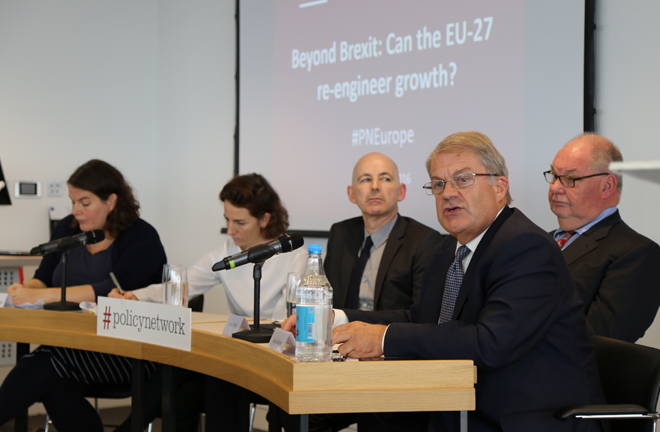Structural reform offers way to preserve EU Single Market

Mark Boleat, chairman of the Policy and Resources Committee at the City of London, speaks at the panel session themed “the Single Market between Ambitions and Reality” during the discussion.
LONDON—Whether European countries like Britain and Germany will remain at the top of the global economy depends on Europe’s economic performance and those nations’ willingness to engage in structural reform, said Peter Mandelson, at a discussion on the EU economy organized by the Policy Network and the European Commission Representation in the UK on Oct 24.
Mandelson, president of the Policy Network, said fiscal policy, the development of the single market, and the rate of investment in technology and human resources are also among the key factors that will determine the economic performance of European countries like Britain and Germany over the next couple of decades.
After witnessing the debates that played out over the course of the Brexit referendum, the EU is now more aware of what it can bring to its citizens, and one essential issue is for it to return to prosperity, said Jacqueline Minor, head of representation at the European Commission Representation in the UK.
To generate growth and jobs, the EU has launched the Juncker Plan and quantitative easing while also working on capital market integration and the Digital Single Market.
Mandelson said there is a gap between the ambitions and realities of the single market. The euro zone needs further reform and faces policy risks in economic recovery. Without economic growth, it will be very difficult for Europe to achieve any other goals, he said.
The European Union is still experiencing slow growth and high long-term unemployment, said Kate Bell, head of the Economic and Social Affairs Department at the UK Trades Union Congress. She said the key priority for Europe is greater investment, which increases jobs and drives up wages, while funding the vital infrastructure needed.
Swedish Finance Minister Magdalena Andersson said different formulas have been proposed to fix the current problems. For Sweden, the priority is structural reform in the euro zone, she said, adding that the commission should implement the policy framework that the member states have agreed upon.
To revitalize growth, the European Union needs to take its pubic financing into account and to strengthen the single market. In addition, it is vital to support free trade and make new efforts to sign trade agreements with the external world, Andersson said.
Mandelson said the single market has been a tremendous driver of the internal trade while the external trade is also vital. People cannot allow the populist trend against trade and globalization to wash over Europe. Some counter-argument is needed to resist such a tendency, he said.
There is evidence that shows free trade has greatly helped the poorest people around the world, and it is not something purely for the rich, said Mark Boleat, chairman of the Policy and Resources Committee at the City of London.
Andersson said it is essential for Europe to remain open and friendly to trade. World economic growth and globalization have brought tremendous gains for numerous families and people, although it is not the case for some others. Efforts should be made to ensure free trade benefits everyone, and to redistribute the opportunities and fruits of global trade, she added.
There is an element of anti-globalist, anti-EU feeling and many misunderstandings about the current nature of the problems, Boleat said, adding that each EU member must address this and decide what is in their best economic interest.
Jiang Hong is a reporter at the Chinese Social Sciences Today.
